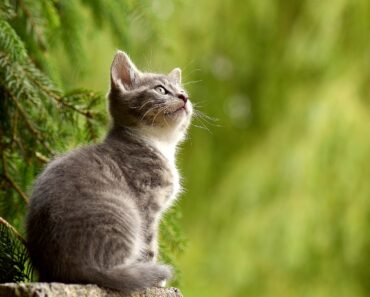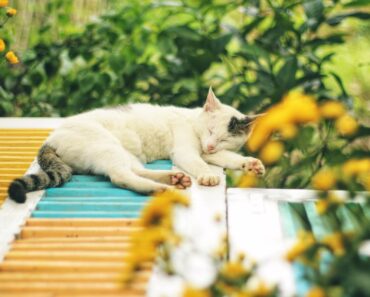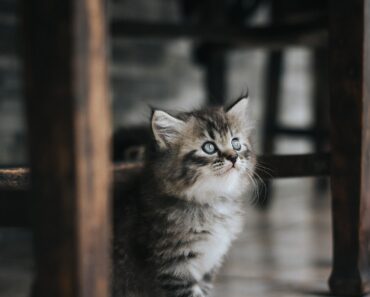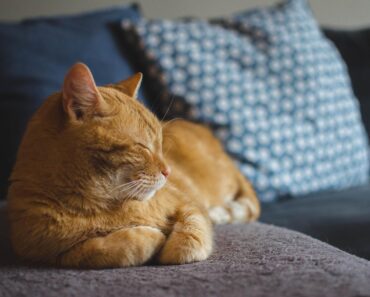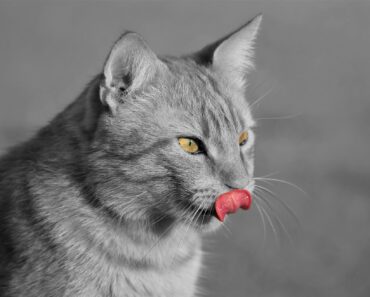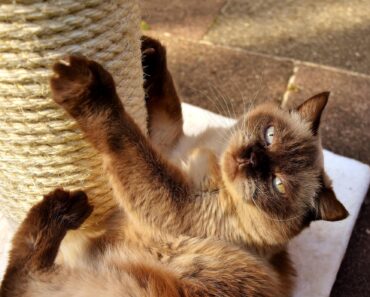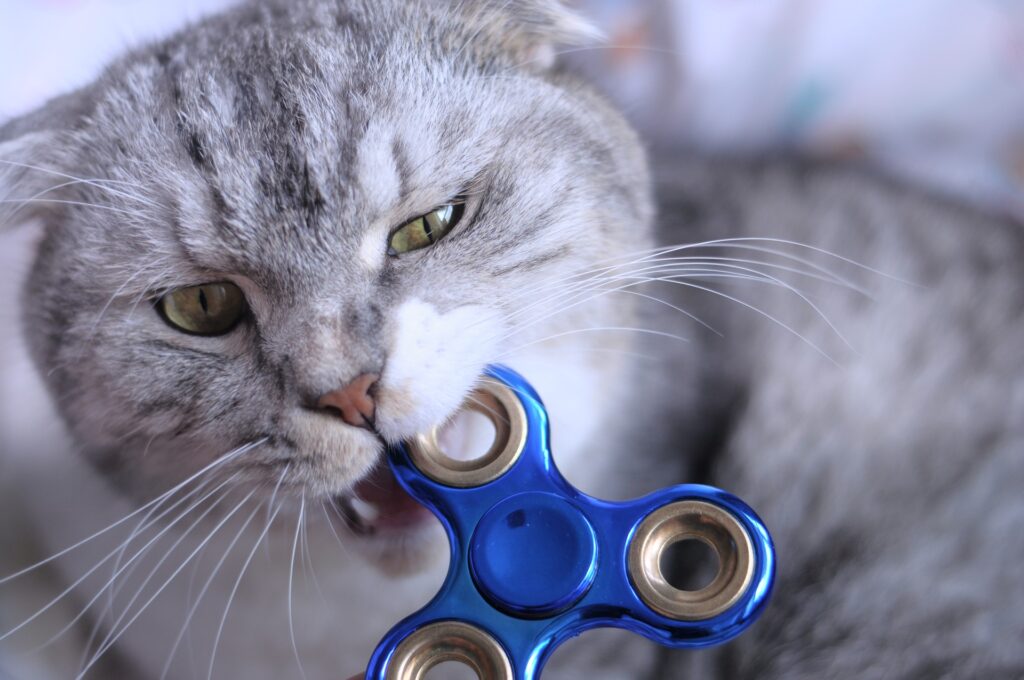
The tendency to bite of the feline family is completely independent of its character. It is typical not only of aggressive cats, but also of the most gentle and sweetest pets. This attack seems especially strange at the time of petting when a few seconds before the animal showed pleasure. The truth is that the nasty-looking “bite” always has an explanation, and its frequency and strength depend on your reactions.
A bite is an instinctive response.
A bite is always the result of an instinct, whether it’s hunting or protecting. Cats train their kittens to catch mice and birds from an early age. They catch their prey with their fangs and if there is no live target, the bite is trained on toys or the owner’s hands.
Only certain ornamental breeds, such as the Ragamuffin, have no hunting instinct. All other “whiskers” differ from each other only in the strength of the urge to pursue and capture moving targets.
While the objective of the hunting instinct is strictly attack, the protective instinct involves both attack and defense. Cats use this instinct under the influence of a wide variety of emotions: fear, anger, pain and even love. In the latter case, they bite their fingers very gently without digging out their claws or damaging the skin. These actions do not hurt, so they can be considered an expression of trust and loyalty.
Why does a cat claw first, then bite
Most whiskered pets will bite, if not in play, then when petting. In this case, there is a sudden change in behavior. The cat to be stroked, which only a minute ago showed no signs of aggression and was quite satisfied, bites its owner in a brutal and deadly way. There are seven reasons for this strange reaction.
Tired of cuddling, wants to stop
The simplest explanation is a loss of interest. Your pet may simply be tired of the extra attention and will let you know instantly with his teeth and claws.
It’s easy to spot the early signs of dissatisfaction. You need to pay attention to non-verbal cues. If the cat looks tense, wags her tail and flaps her ears, you should leave her alone.
Does not want human contact
All animals are very different. Some like to be scratched behind the ears, some like to have their bellies rubbed, and some like neither. In the latter case, pets are more than happy to sit on your lap, “knead the dough” and rub their face against their owner’s hands, but immediately turn into a fury if you touch them.
The same situation will occur if the cat has just had a hot bath. His aggression can be explained by unjustified expectations, since he came in the first place to a place of warmth, not to a human.
Petting in an unpleasant place
Most cats like to be petted on their head, chest and back, as well as on the base of their tail and neck. They are very different on their bellies and paws. Only a few will touch these areas, so don’t be surprised if your pet is no exception.
In addition to aversion, your pet may also be in pain. In this case, it is either too much or too rough handling or trauma to the area. If health problems are suspected, your pet should be taken to the vet.
The most contradictory feeling is caused by tickling. It is neither pleasant nor painful and is essentially a reaction to many irritating urges. Due to the amount of information received, the brain fails to recognize the signals and activates a defense mechanism: biting.
is out of control.
Sudden play cannot be ruled out either. Vigorous kicking with the hind legs during a descent is used in the wild as a means of self-defense. If the owner does not pose a threat to his pet, this behavior should be understood as wrestling. Kittens have a particular penchant for this kind of entertainment.
Scared
Whiskered animals are very sensitive to sound. If a cat dozes off in your hands while you pet her, a ringing phone or the accidental dropping of a snowball on your windowsill can make her aggressive. In this case, she won’t attack the source of her fright, but a nearby object.
Trying to dominate
Unlike dogs, cats are not used to living in packs. They don’t like to submit to humans because they see themselves as the rightful leaders. The only exceptions are the good-natured breeds, which are known for their dog-like loyalty.
The dominant cat bites the human to demonstrate its control. It shows that it will only accept cuddling and petting if it wants to, so it is a true alpha male.
Increased nervousness
Stress can also be a cause of aggression. If an animal is in an uncomfortable environment, it may have difficulty relaxing, even when being petted. In this case, the irritating factor should be identified and attempts made to eliminate it.
How to react to a bite during petting
The owner’s reaction determines the animal’s subsequent behavior. If you are bitten, follow these tips:
- Hit the cat on the nose. This action will turn it away from your hands. The most important thing is to calculate the correct amount of force to apply. It should be unpleasant but not painful.
- Make a high-pitched sound. A whistle or hand clap will also distract and stop the furry aggressor.
- Spray a stream of water from a spray bottle. Your wet pet will want to lick its coat and leave you alone.
- Silently exit the room. By walking away, you will show your pet that a bad reaction will cause him to lose attention. This method is only effective if the pet is not tired of being petted. It is also not appropriate if he is in pain, stressed or afraid.
Under no circumstances should it be allowed to respond with aggression. A loud noise or anger will annoy or frighten the cat. In both cases, the unwanted behavior will only be reinforced and with it a lack of trust in humans.
Pay attention to your body language. Be sure to stop petting if the following signs occur:
- Pressing the ears against the head or spreading them apart;
- A slight wagging of the tail and back;
- A whistling or unhappy meow;
- Body tension.
Avoid intrusive or coercive behavior. Don’t pet your cat if she is nervous and tries to get away from you. Remember tact and the right to your personal space. Your pet deserves it as much as you do.
How to prevent a pet from biting its owner’s hands?
The urge to bite is formed during childhood. Babies love to play wrestling and hone their hunting skills. It’s very important at this stage not to encourage arm and leg attacks, as an already adult cat can cause quite serious damage in the future.
If you want to wean him from this habit, here are some tips:
- Stock up on toys. The kitten should have an alternative that she will be encouraged to play with.
- Stop the game if you are bitten and ignore any attempt to continue. At first, she will lose interest and back off, but then she will make the connection between the bite and the opportunity to play together.
- Don’t forget socialization. Don’t raise your kitten in a vacuum, but don’t push it too hard either. Don’t allow guests to take your pet against its will.
Remember that in addition to instincts, animals are driven by learned reflexes. These are formed through socialization and education, which means that it is up to you to adapt the final behavior pattern to your wishes.

